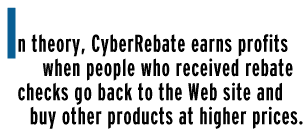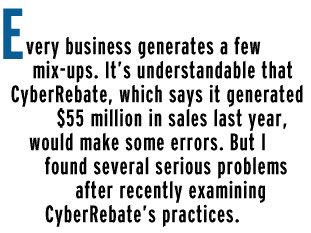| |||||||||

When "free" products are no bargains
 CyberRebate, a Web site that offers huge rebates on consumer electronics--even 100 percent rebates that make some products "free"--is being criticized by many customers for prices that are inflated and rebate checks that never arrive. CyberRebate, a Web site that offers huge rebates on consumer electronics--even 100 percent rebates that make some products "free"--is being criticized by many customers for prices that are inflated and rebate checks that never arrive. The Better Business Bureau of New York has given CyberRebate its lowest rating: Unsatisfactory. The BBB says it's received 72 complaints in the past 12 months, including some for "non-delivery of ordered merchandise" and "failure to provide refunds." Meanwhile, consumer-protection organizations, such as the New York State Attorney General, ScamHound and eComplaints, are filled with disturbing stories Every business generates a few mix-ups. It's understandable that CyberRebate, which says it generated $55 million in sales last year, would make some errors. But I found several serious problems after recently examining CyberRebate's practices: CyberRebate offers Studio DV, a digital-video board by Pinnacle Systems, for $199.99 if you pay by credit card. If you fill out detailed rebate forms at the Web site after receiving the product, CyberRebate says it will mail you a $100 check within 14 weeks. If you cash this check, your net price would thus be $99.99. But a quick price comparison at a shopping bot, CNET Shopper, reveals that this isn't a bargain: The highest price asked by any e-commerce site for an identical Studio DV board is $99.99, including shipping.
And the lowest price, including shipping, is only about $90. None of the e-commerce sites listed at CNET Shopper, of course, require customers to fill out any rebate forms or wait several months for rebate checks Besides computer products, CyberRebate offers a "100 percent" rebate on several different toys, accessories and other items. But the "free" items are vastly overpriced. Many are priced seven times higher than standard retail--something that Internet newbies may not realize. A typical example is the Barbie Cash Register, an electronic toy. CyberRebate offers it for $386.99, but promises a $386.99 rebate.
Ephemeral bargains? The second, more serious problem is that consumers' credit cards are charged inflated amounts, but no rebate check is promised for up to 14 weeks. In the United States, the Federal Trade Commission's regulations require consumers to dispute bad credit card charges within 60 days (nine weeks) of billing. Other countries' laws vary. If a problem with the rebate becomes apparent 14 weeks after the order, therefore, consumers in the United States have no right to reverse the charges. In theory, CyberRebate earns profits when people who received rebate checks go back to the Web site and buy other products at higher prices. But also consider the following: • After receiving a product they’ve paid for, many people will never return to the Web site to fill out the rebate forms. • If a rebate check never arrives after 14 weeks, some people will forget about it rather than pursuing a complaint, even for amounts of $100 or more. In a telephone interview, CyberRebate CEO Joel Granick said about the BBB report, "I can't tell you we haven't had challenges along the way." He added, "What we've done at CyberRebate is to take every complaint very seriously." Granick said that in the rebate industry as a whole, consumers fail to submit rebate forms 90 percent of the time. But he said only about 5 percent of CyberRebate's customers don't submit the forms. If that's true, it represents a huge profit margin on products that are priced at several times the normal retail rate. My advice? Don't whip out your credit card in hopes that you might get a rebate check three and a half months later. Consumer advocate Brian Livingston appears at CNET News.com every Friday. Do you know of a problem affecting consumers? Send info to tips@BrianLivingston.com. He'll send you a book of high-tech secrets free if you're the first to submit a tip he prints.
on the soapbox |
|
|||||||||||||||||||||||
|
Send us news tips | Contact Us | Corrections | Privacy Policy |
|

